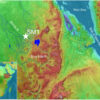How do you pronounce your “r”s towards the ends of words like Shearer, purr, nerd and pore? And what about those in car, bird and her?
Chances are that if you are British, you will likely soften it out so that it sounds more like an elongation of the vowel rather than the kind of “r” you find in words such as red or right.
The evidence is, according to Lancaster University researchers, that “r”s are becoming a thing of the past in England—apart from in Blackburn, where the “r” is still very much rolling.
Traditionally, parts of Lancashire have very clearly articulated “r”s, similar to the stereotype of Cornwall and the West Country. The pronunciation of these “r”s towards the ends of words is called rhoticity.
In fact, historically, hundreds of years ago, people throughout England used to pronounce strong “r”s. But now, says the research paper, these strong “r”s are definitely dying out.
In Blackburn, young speakers do mostly say their “r”s, but they are, according to the research team, phonetically very weak and often difficult to perceive. And they pronounce them less frequently than older speakers.
According to lead researcher Dr. Danielle Turton, who worked with Dr. Robert Lennon on the research project, the “r” in the spelling for speakers from these areas means that it should be pronounced like an “r” at the beginning of a word, rather than just creating a longer vowel.
“Speakers from places like Blackburn usually differentiate between pairs of words such as ‘stellar’ and ‘stella’, whereas most of England would consider them to be the same,” says Dr. Turton.
“However, for the youngest speakers in Blackburn, these ‘r’s are very weak, which raises the question of whether future generations will even hear these weak ‘r’s at all and whether this distinction will eventually fade away. Accent change is often like a puddle: it dries up in most places and leaves remnants around the edges, hence why Cornwall and East Lancs behave similarly here today.”
The paper, “An acoustic analysis of rhoticity in Lancashire“, published in the Journal of Phonetics, examines rhoticity—the pronunciation of the consonant “r.”
It presents the first systematic acoustic analysis of a rhotic accent in present-day England. The dataset comprises spontaneous and elicited speech of 28 speakers from Blackburn, where residual rhoticity remains, having never been lost in earlier sound changes which rendered most of England non-rhotic.
“Although sociolinguistic studies of rhoticity in England exist, there are almost no descriptions of its phonetic properties, so this is the first time we’ve been able to monitor this change from a gradual weakening of the ‘r,'” explains Dr. Turton. “This is notable because it provides evidence for language change happening so gradually that people don’t notice it.”
Most sociolinguistic studies of rhoticity focus on the South West of England, and relatively little is known about rhoticity in the North.
The study is timely because Northern rhoticity is predicted to disappear in the next few generations, a process which is now complete in many areas of the South West.
Interestingly, rhotic Blackburn and East Lancashire speakers may be in the minority in England, but they are in the majority across the English-speaking world: North American, Scottish, and Irish speakers also have this pronunciation, as do many second language learners of English.
That said, phonetically, the East Lancashire “r”‘ is weaker, possibly as a result of it undergoing change towards the England standard.
The research carried out with the Blackburn speakers also found:
Rhoticity was stronger in males, a pattern of results which suggests a female-led sound change, a widely documented phenomenon in the sociolinguistic literature. When language changes, women usually start it.
The majority of sample speakers became more rhotic in more formal styles, raising interesting questions about social prestige and clearness of speech, as well as the location of change in the speech community’s consciousness
The strongest “r”s are found in the oldest men, but these are still weaker than “r”s found in Scotland or North America.
“In recent years, there has been a lot of talk about the disappearance of traditional dialects and the linguistic homogenization of regions in England,” adds Dr. Turton. “Unfortunately, it seems that this is the case for the East Lancashire ‘island of rhoticity.’
“In the next few generations, this traditional feature may be lost. That being said, Blackburn still retains many other vowel features that make it unique, and changes like this often pave the way for further linguistic evolution in the future.”
More information:
Danielle Turton et al, An acoustic analysis of rhoticity in Lancashire, England, Journal of Phonetics (2023). DOI: 10.1016/j.wocn.2023.101280
Provided by
Lancaster University
Citation:
Researchers fear the British spoken ‘r’ is ready to roll away from the last bastion of rhoticity (2023, December 19)



